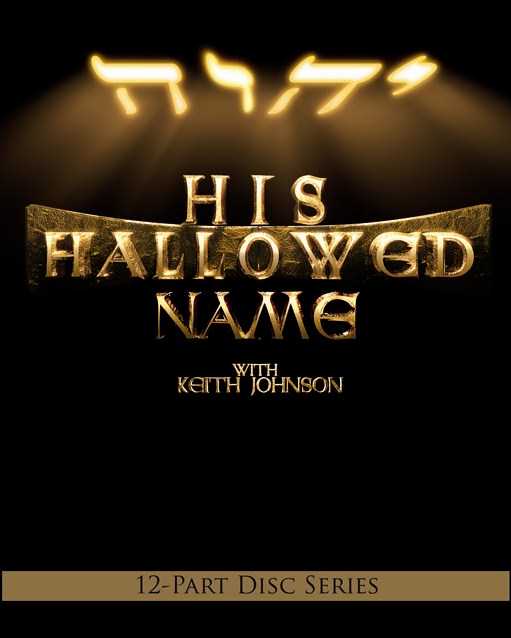Keith Johnson – His Hallowed Name Revealed Again

His Hallowed Name Revealed Again by Keith Johnson is now available in a 12 part DVD series!
Truth2U Radio is hosted, edited, and produced by Jono Vandor and all programs are made freely available to download. If these programs have been a blessing to you please consider showing your support by contributing a donation or partnering with Truth2U on a weekly or monthly basis. Thank you for listening!

Audio clip: Adobe Flash Player (version 9 or above) is required to play this audio clip. Download the latest version here. You also need to have JavaScript enabled in your browser.
Download this episode (right click and save)





I’ve started reading Keith’s book and I’m thoroughly it enjoying thus far so I look forward to hearing this discussion with him. May you and your family be blessed during this wonderful season of set apart days!
It is never a mistake what Yahweh brings into our lives. Thank you for this in my life at this time as I have been on a quest of bringing HIS NAME forward to all I know. He clearly states throughout the scriptures that we are to SAY His Name. I fear for those who chose to use titles. Thank you for this interview.
This was a very enjoyable video! I really don’t know either of you but surely two great personalities have met.
I’m on a video?!?!?!?
As to the “name Jehovah”, if you check out the rabbinical Orthodox Siddur, you will notice that many of the so called “blessings” are really cursings. The rabbinical view of Father Elohim is that of their Avenging destroyer. One of many good examples is the “Amidah” also called the “Shemoneh Esrei” which means 18 and there are 18 blessings… plus 1 curse against heretics (believers in Yeshua). Instead of asking Father Elohim to illuminate those who rabbinical Jews believe are sinners and prevent their evil designs from coming to fruition , they ask Father Elohim to act as an avenging “destroyer” hence their name “Jehovah” Ye-Hovah “He will destroy” (The Destroyer) even tho they know that YHWH means “TO BE” past, present, future and causative. YHWH is terrifying enough, to invoke His wrath can cut both ways. I believe it is prudent to call Him “The One Who Is and Causes to be” (YaHuWeH).
Yehovah Defined
“Ye” = 3rd person future i.e. He or she will – in this case, He will.
“hovah H1943” = (in the sense of eagerly coveting and rushing upon; by implication of falling); desire; also ruin: – calamity, iniquity, mischief, mischievous (thing), naughtiness, naughty, noisome, perverse thing, substance, very wickedness. Look it up yourself.
Is this the name of the Creator or the “fallen one”?
Strong’s #H1943
הוה
hôvâh
ho-vaw’
Another form for H1942; From H1933 (in the sense of eagerly coveting and rushing upon; by implication of falling); desire; also ruin: – calamity, iniquity, mischief, mischievous (thing), naughtiness, naughty, noisome, perverse thing, substance, very wickedness.
The NAME, YHWH [ יהוה ], is a combining of three different verb forms sharing the same root YWH:
HYH hayah [ היה ]: = “He was”
HWH howêh [ הוה ]: = “He is”
YHYH yihiyêh [ יהיה ]: = “he will be” (masculine third person singular future form of היה )
In the present להיות is not used, but it’s frequently used in the past and future. In the present you’ll often see the pronouns הוא, היא, הם, הן standing in for the third person, agreeing with the gender and number of the subject.
A plethora of Hebrew names contain part of the Creator’s NAME as the suffix “Yahu”. Yahweh, pronounced Yáwhuweh is self existent and independent of the time-space construct and laws of physics He created for us.
According to one Jewish tradition, the Tetragrammaton is related to the causative form, the imperfect state, of the Hebrew verb [ הוה ] (ha·wah, “to be, to become”), meaning “He will cause to become” (usually understood as “He causes to become”).
Compare the many Hebrew and Arabic personal names which are 3rd person singular imperfective verb forms starting with “Y”, e.g. Hebrew Yôsêph = Arabic Yazîd = “He [who] adds”; Hebrew Yihyeh = Arabic Yahyâ = “He [who] lives”.
Strong’s #H1961
היה
hâyâh
haw-yaw’
A primitive root (compare H1933); to exist, that is, be or become, come to pass (always emphatic, and not a mere copula or auxiliary): – beacon, X altogether, be (-come, accomplished, committed, like), break, cause, come (to pass), continue, do, faint, fall, + follow, happen, X have, last, pertain, quit (one-) self, require, X use.
Yes, use His NAME in ALL blessings and prayer, also to declare that He is the Elohim that you are talking about, but don’t overuse His NAME in conversation. ALWAYS , use His NAME with utter reverence. May I suggest DECLARING your reverence after uttering His NAME: Shall Your NAME be praised forever, Blessed is Your NAME etc. The Muslims say praises after each and every time they say “allah” the name of their “moon god of war” also known as “Sin” (pronounced Seen). The Jewish sages are recorded as using such praises in connection with the NAME of our Elohim, should we not do at least as much for our saving Elohim of Truth?
Be well, BerekhYahu
A Disastrous Misunderstanding of the Name Yehovah
by Nehemia Gordon on Thursday, 26 August 2010 at 22:24
Keith Johnson just came out with a new book on the name of the Creator entitled His Hallowed Name Revealed Again. In this new book Keith follows up on what we wrote in our joint book A Prayer to Our Father about the phrase “may your name be sanctified”. Keith’s new book is based on the 180-page study he released earlier this year which has now gone through a series of expansions, revisions, and changes. Now its a bona fide book, but I think I’ll still continue to refer to it as his “little study”. Anyway, the release of Keith’s little study has prompted a flurry of e-mails and messages asking me once again about the pronunciation of the name of Yehovah and its relation to the Hebrew word for “disaster”. This question almost invariably comes from people who either don’t know Hebrew or know just enough to be dangerous to themselves. I’m not putting these people down. I applaud them for trying to understand Hebrew the best they can with the limited tools available to them. This is just me venting my frustration at having to explain basic Hebrew grammatical concepts.
The question starts off with the observation that the Hebrew word hovah means “disaster, calamity”. This word appears three times in the Tanach, once in Isaiah and twice in a single verse in Ezekiel:
“Evil is coming upon you which you will not know how to charm away; disaster (hovah) is falling upon you which you will not be able to appease; coming upon you suddenly is ruin of which you know nothing.” (Isaiah 47:11)
“Calamity (hovah) shall follow calamity (hovah), and rumor follow rumor. Then they shall seek vision from the prophet in vain; instruction shall perish from the priest, and counsel from the elders.” (Ezekiel 7:26)
Since hovah means “disaster” or “calamity”, the question goes, doesn’t this mean that Yehovah also means “disaster” or “calamity”. I guess this makes sense to those innocent of basic Hebrew grammar but in the Hebrew language this makes no sense. This would be like saying that the English word “assume” is derived from the word “ass” because when you ass-u-me you make an ass of you and me. Someone actually told me this many years ago and they were dead serious. Of course, an examination of any historical English dictionary will reveal that “assume” actually comes from the Latin verb “assume(re)” and not from the English word for a donkey.
Let’s look at some Hebrew basics before we get ourselves in trouble assuming. With a few exceptions, every word in the Hebrew language has a three-letter root, something proven in the 11th century by the Spanish rabbi Yonah Ibn Janah. Modern linguistics has confirmed this, observing that the three-letter root is a basic characteristic of all Semitic languages. Most Hebrew roots are “whole” roots meaning all three letters of the root are present regardless of how the root is used in different grammatical forms. For example, the Hebrew root SH.M.R. has the basic meaning “to guard”. Hebrew can use this root in dozens of ways, each with a different shade of meaning, such as the verbs SHaMaRti “I guarded” and hiShaMeR “be careful” (be on guard), the noun miSHMeRet meaning “duty” (which a person has to be on guard to keep), and the names SheMeR and SHoMRon. As a “whole” root, the letters shin mem resh are always present in words derived from this root.
The opposite of a “whole” root is a “hollow” root. In “hollow” roots, one or more of the three letters of the root can be absent in certain grammatical forms. For example, the root BNH בנה “to build” loses the third letter of the root in the verb baniti (spelled BNYty בניתי) “I built”. In this form of the verb, the H of BNH drops and is replaced by a Yod. If you didn’t know about hollow verbs and saw the word baniti you might think the root was BNY בני when in fact it is BNH בנה.
You’re probably thinking, “When is he gonna talk about the name?!” Ok, here goes. The name Yehovah derives from the three-letter root HYH which means “to be”. We know this from Exodus 3:14 in which the Almighty explains his name as “Ehyeh Asher Ehyeh”. The word Ehyeh is an “imperfect” verb from the root HYH meaning “to be”. In later Hebrew, the “imperfect” form took on the meaning of “future” but in Biblical Hebrew it primarily expresses a repetitive action. In plain English, Ehyeh means “I am now and I will continue to be in the future”. This is why Ehyeh Asher Ehyeh can be translated as “I am that which I am” but also as “I will be that which I will be”. Both of these translations are correct even if they are a bit inaccurate. An accurate translation would be: “I am now and will continue to be in the future that which I am now and will be continue to be in the future”. That’s quite a mouthful and you can see why most translations prefer to dumb it down.
The word eHYeH has all three letters of the root HYH which may lead you to conclude that HYH is a “whole” root. However, in other forms of the verb, the second and third letter drop which means it is a “hollow” root. For example, HaYiti (spelled HYYty הייתי) “I was” is missing the third letter of the root H and in its place has a Yod. On the other hand, the masculine singular imperative Heveh (pronounced Heh Vay) “be!” is missing the second letter of the root and in its place has a Vav. This last piece of information is crucial becomes it means in certain forms the root looks like HVH even though in fact it is HYH. This can be confusing because there is an unrelated root which really is HVH and which has an entirely different meaning from HYH. Don’t worry, I’m almost done with the crash course in Hebrew grammar.
Now back to the name. Yehovah comes from the same root as Ehyeh: the hollow root HYH. Yehovah is actually a combination of three verb-forms: Hayah “he was”, Hoveh “he is”, and Yih’yeh “he is now and will continue to be in the future”. Together Hayah, Hoveh, and Yih’yeh combine into the name Yehovah. But does the meaning of the name tell us its pronunciation? Not necessarily. Many ancient Hebrew names stray from the vowel patterns found in common nouns and verbs. For example, my name Nehemia (pronounced N’chem-Yah) means “Yah comforts”. However, if I said “Yah comforts” in a regular Biblical Hebrew sentence it would be Nee-chaym Yah. Why is my name pronounced N’chem-Yah and not Nee-Chaym-Yah? As we say in Hebrew: Kachah! Just because! Hebrew names don’t follow the same rules as common nouns and verbs. Deal with it! The bottom line is the meaning of YHVH as “he that was, he that is, and he that will be” doesn’t tell us how to pronounce the name. The pronunciation Yehovah is based on Hebrew Masoretic manuscripts, but for that you’ll have to read Keith’s little study.
Let’s get back to the hollow verbs. We saw that “Yehovah” comes from the hollow root HYH and as a result the Y can be replaced with a V in certain forms. To the untrained eye this makes it look like the root is HVH when in fact it is HYH. Remember the word Hovah meaning “disaster”? That word actually does come from the root HVH, which means “destruction”. There is no connection between the name Yehovah and the word hovah because they are from two unrelated Hebrew roots: HYH “to be” and HVH “destruction”. Pronouncing the name as Yehovah doesn’t change this situation. Even though Yehovah sounds like it contains the word hovah “disaster” within it, this is a pure coincidence, just like the word “assume” which sounds like it contains the word “ass” in it. It doesn’t mean that Yehovah means “disaster” nor does it mean Yehovah is connected in any way to the word for “disaster”. If you assume that to be the case, then you’re just making an ass of yourself. And don’t forget, that’s my role!
Nehemia Gordon continues to be a voice of reason balancing against some of the pit-falls of rabbinical Judaism like their interpretation of ‘the morrow after the Sabbath’ (Lev 23) or ‘their’ interpretation of “in every place where I cause My name to be remembered (to speak up for)” (EX 20:24) (they say ‘mentioned’ and all that they say the word ‘mentioned’ implies). Education can sometimes contain within it some indoctrination. On the issue of the name Jehovah, relying on the vowel points of the Masoretic Text, it may be that education might have gotten in the way of common sense. It is difficult to believe that Father God would have the Israelites pronounce His NAME in a way that it could be confused with or associated with the ‘Evil Destroyer’. (As if we didn’t have enough problems getting it right with Yahuweh, praised be His NAME)(Some maintain that His NAME should be pronounced Yahuah or simply Yah, but not Jehovah) Jews maintain the pronouncing of each of the Hebrew words of the Older (Hebrew) Testament with the vowel markings of the Masoretic Text. Since the Masoretes were rabbinical Jews who followed the additional laws of the Pharisees which include the prohibition of pronouncing the NAME of God, it is highly doubtful that they would provide the correct vowel markings to violate their own prohibition. So, to use their vowel markings to pronounce the NAME of God is highly questionable. It is unknown who schemed this pronouncing of Father God’s NAME as Jehovah or for what reason.
Jeremiah 16:19; O LORD, my strength and my stronghold, And my refuge in the day of distress, To You the nations will come From the ends of the earth and say, “Our fathers have inherited nothing but falsehood (lies), Futility and things of no profit.” (NASB)
Discern well and stay on your toes as not to be a push-over, BerekhYahu
The words ‘push-over’ are NOT meant for Nehemia Gordon, they are meant for all of us in these last days. BerekhYahu
religious devils hate the truth, and I know they are hating the truth of the Name being revealed as it is suppose to. The Lord said in the Ten words (commandments) NOT TO USE THE LORD’S NAME IN VAIN. He never said in the commandments that WE COULDN’T SAY HIS NAME. That is man’s made up religious assumption. If the Lord didn’t want us to say His name, He would have said so when He gave the TEN WORDS (commandments). Thank you Keith and Nehemia. I know the Lord is using you both.
I stand corrected, i.e. I’ve made an ass of my self. The vowel points in the Hebrew Tanakh (Older Testament) clearly obscure the NAME of the Creator. Pronouncing the NAME of the God of Abraham, and the God of Isaac, and the God of Jacob is a well-known rabbinic taboo, I had no idea that the Karaites (at least at the time of the Masoretes) also held to the same taboo. So I ASS-U-MEd that the Masoretes were rabbinical. I sincerely apologize for this misinformation. However, I must still assert that it is nonsensical to use the Hebrew vowel points that clearly obscure the NAME of the Creator to pronounce the NAME of the God of Abraham, and the God of Isaac, and the God of Jacob. The common scholarly way to Pronounce His NAME is Yahweh, better Yahuweh, some insist Yahuah and many play it safe and say Yah. “A-hallelaw Shimkha (אֲהַלְלָה שִׁמְךָ)” (I praise Your NAME). (The following is from Wikipedia) The Masoretes (ba’alei hamasorah, Hebrew בעלי המסורה) were groups of mostly Karaite scribes and scholars working between the 7th and 11th centuries CE, based primarily in present-day Israel in the cities of Tiberias and Jerusalem, as well as in Iraq (Babylonia).
Do your own research and discern what is true, BerekhYAHU
Hello,
For a proper investigation of Hayah, Hoveh, YIhyeh making YEHOVAH, watch this 20-minute video:
https://www.youtube.com/watch?v=DK1tY9YdzFs